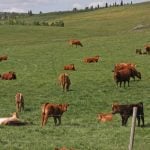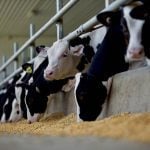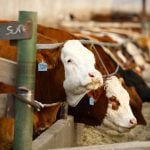Funeral services are to be held Saturday for the man beneath the green Stetson hat who took the helm of Canadian agricultural policy throughout the Trudeau administration.
Eugene Whelan, Canada’s agriculture minister from 1972 to 1979 and 1980 to 1984, died late Tuesday at age 88. According to the Windsor Star on Wednesday, Whelan’s death, at his home in nearby Amherstburg, Ont., was due to complications from a stroke he suffered in 2012.
“As Canada’s agriculture minister and in his trademark green Stetson, Eugene was planted firmly on the side of farmers,” federal Agriculture Minister Gerry Ritz said in a statement Wednesday, describing Whelan as “a strong voice for Canadian farmers for decades.”
Read Also

China seeks improved ties with Canada amid rising trade tensions
China called on Friday for steps to improve bilateral ties with Canada, saying there were no deep-seated conflicts of interest, following a spike in trade tensions with many of Beijing’s Western trade partners this year.
Interim federal Liberal leader Bob Rae hailed Whelan on Wednesday as “an icon of Canadian politics, a real fighter who devoted his entire life to the service of community and country,” whose “incredible contributions to agriculture and rural Canadians will long outlive this shining example of a man.”
The party “shall always remember his wry sense of humour, his ability to get to the heart of issues, his deep interest in the success and prosperity of people everywhere,” Rae said.
Among other tributes Wednesday, the Ontario Federation of Agriculture — for which Whelan had served as a director — took to Twitter to call him a “true champion of Canadian farming.”
Among federal Liberal leadership candidates, Martin Cauchon hailed Whelan as a “larger-than-life Liberal;” Justin Trudeau eulogized Whelan with the Twitter hashtag #goodbyegreenhat and retweeted a picture of himself as a child, speaking to Whelan dressed as Santa Claus.
Named an officer in the Order of Canada in 1987, Whelan was cited as “The Great Canadian Farmer” who “turned Canada into a country known the world over for the efficient production of top-quality food” and “devoted himself to the cause of worldwide hunger through long-term agricultural improvement in developing countries.”
Whelan’s political career in southwestern Ontario began on a local school board in 1945 and on the council of Anderdon Township in 1949. As a farmer, he served as president of the Harrow Farmers’ Co-operative, as a director with the United Co-operative Board and Co-operators Insurance Association, and as a founding member of the Ontario Winter Wheat Producer Marketing Board.
He first came to the House of Commons in 1962 as the Liberal MP for Essex South, during John Diefenbaker’s Progressive Conservative administration. Whelan held the constituency for the Liberals in elections in 1963, 1965, 1968, 1972, 1974, 1979 and 1980, becoming a member of the Commons standing committee on agriculture and colonization in 1962.
During Lester Pearson’s Liberal administration, Whelan chaired the standing committee on agriculture, forestry and rural development from 1966 to 1968. He later served as parliamentary secretary to the minister of fisheries (1968-70).
“It can be done”
However, Whelan would be entrenched in Canadian political imagery after then-prime minister Pierre Trudeau named him minister of agriculture in November 1972, a point when Canadian farmers were watching net farm incomes drop and interest rates climb.
With the aim of protecting net farm income, his department oversaw amendments to the federal Agriculture Stabilization Act in 1975 to provide for coverage of farmers’ current costs of production, followed by the Western Grain Stabilization Act in 1976, setting up the ag income stabilization framework that lasted into the early 1990s.
According to the Canadian Agricultural Hall of Fame, into which he was inducted in 2001, Whelan “fought hard to maintain a level playing field in world markets at a time of heavy subsidization in other countries.”
Whelan’s stint as ag minister also saw the expansion of supply-managed commodities in Canada beyond the dairy and egg systems set up in 1970 and 1972, to include turkey in 1974 and chicken in 1978.
Controls over the movement of Prairie feed grains were also lifted to allow private-sector feed grain trading and interprovincial movement of feed, which by 1975 left the Canadian Wheat Board, which until then had exclusively controlled such movements, in charge of feed sales only for export.
The hall of fame also noted Whelan’s role in raising loan limits at the federal Farm Credit Corporation (now Farm Credit Canada) to help beginning farmers; in setting up the program of federally-guaranteed advance payments for crop growers; and in opening markets in the then-Soviet Union for Canada’s wheat.
On the international stage, Whelan was elected president of the United Nations’ now-defunct World Food Council, holding that post from 1983 to 1985.
Speaking as ag minister to a committee meeting of the UN-backed Codex Alimentarius Commission in 1980, Whelan warned it would be “essential, in my opinion, to get better nutritional value from the food we are presently capable of producing so that the year 2000 will not be the start of the ‘Starvation Century.'”
The world’s producers, he said, could meet that challenge “if our achievements of the past are any indication. I also believe that the future will be in the technological advances associated with plant proteins.”
He told Codex’s committee on vegetable proteins he was “looking towards the time when Canada will become the overall world leader in agriculture per capita production” and had “no doubt in my mind that it can be done, based on the past performance of the Canadian farmer.”
Whelan left federal politics in 1984 after his defeat by John Turner in that year’s federal Liberal leadership race, but was appointed that year as Canada’s first ambassador to the UN’s Food and Agriculture Organization, where according to the hall of fame he signed memoranda of understanding on agriculture co-operation with China and the Soviet Union.
He was pulled back into federal politics in 1996 when then-prime minister Jean Chretien named him to the Senate, where he served as vice-chair of the Senate standing committee on agriculture and forestry until his mandatory retirement in 1999.
Among other honours, Whelan was named a life member of both the Ontario Institute of Agrologists and Agricultural Institute of Canada, and was also inducted into the Ontario Agricultural Hall of Fame in 2001.
The funeral mass for Whelan is to be held Feb. 23 at 11 a.m. at St. John the Baptist Church at 225 Brock St. in Amherstburg, about 20 km south of Windsor. Memorial donations may be made to the church’s restoration fund, the Heart and Stroke Foundation or a charity of one’s choice.
Related story:
Dairyman turned ag minister John Wise, 77, Jan. 12, 2013

















